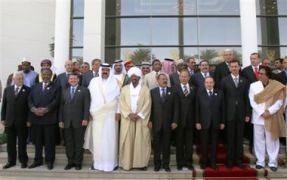Absentees, weak results again Arab summit hallmark
Mar 29, 2006 (KHARTOUM) — A familiar tale of leaders who preferred to stay at home and only nebulous results dogged this year’s Arab summit, despite promises of financial support to the Palestinians and Sudan’s Darfur region.
 There was no Egyptian President Hosni Mubarak or Saudi King Abdullah at the summit which concluded on Wednesday, while any Arabs hoping for major and transformative decisions beyond expressions of support were left disappointed.
There was no Egyptian President Hosni Mubarak or Saudi King Abdullah at the summit which concluded on Wednesday, while any Arabs hoping for major and transformative decisions beyond expressions of support were left disappointed.
“All Arab summits show political and financial support, but experience has proven that words are rarely followed by acts and that they have an ineffective impact on the conditions of the Arabs,” an Arab diplomat who has attended several summits in the past told AFP.
“The summit of Khartoum has been characterised from the beginning of being weak in representation and disagreements over funding, despite a demonstrated Arab solidarity,” he said, requesting anonymity.
Only 14 out of the 22 Arab heads of states took part in the two-day summit.
Among the absentees figured Saudi King Abdullah, whose country’s financial strength and a wide network of international relations, mainly with the United States, gives him a leading political role in the Arab world.
“King Abdullah was absent because he wanted to avoid having to meet Libyan leader Moamar Kadhafi,” said a diplomat, recalling a number of Arab summits which saw reconciliations taking place between Arab leaders.
He said that a late Saudi request to transfer the next annual summit from Riyadh to Cairo “stems out from the same logic.”
The impact of the absence of Egypt’s President Hosni Mubarak — another Arab heavyweight — was naturally felt in the Khartoum summit due to the traditionally strong position held by his country.
Egypt played a leading role in the Arab-Israeli conflict before it signed a peace agreement in 1978, which turned it into a major peace mediator favoured by the United States.
The confirmation of the absence of several leaders and reports of squeezing the summit’s agenda into one day inevitably led to early predictions of weak results.
The stretching of the squeezed agenda for couple of hours on Wednesday did not beef up the weak resolutions already agreed upon by foreign ministers since Sunday.
The support to the Palestinians and Iraq, in addition to peacekeeping efforts in Sudan’s Darfur region, were the most striking points of the final declaration read by Arab League chief Amr Mussa.
“Since the last summit held in Khartoum in 1967 and its famous Three Nos, refusing to surrender and make peace with Israel, things have not stopped worsening for the Palestinians,” a member of the Palestinian delegation told AFP.
“Egypt and Jordan have signed peace deals with Israel and the Palestinians in the occupied territories and the diaspora live the worst moments of their history, abandoned to their fate, while the hope to establish a state is fading despite decisions of summits in the past, present and future,” he said.
“This summit has promised to study compensating us in the future for revenues we were deprived from by Israel, while only a third of the aid agreed in the past has been released,” he added.
Pressed by their host nation, Arab countries agreed to extend an aid package to finance the African Union peacekeepers in Sudan’s Darfur for six months starting in October 2006.
But despite an earlier promise to channel 150 million dollars through this aid package, the figure was removed in the final resolution, leaving the amount to the discretion of member states.
“This ambiguity says a lot about the Arabs’ incapability to contradict the Americans and about their respect to promises they make to other Arabs,” said the Palestinian delegate, saying Somalia is still waiting to recieve a 26 million dollar aid package promised back in 2005.
(ST/AFP)
